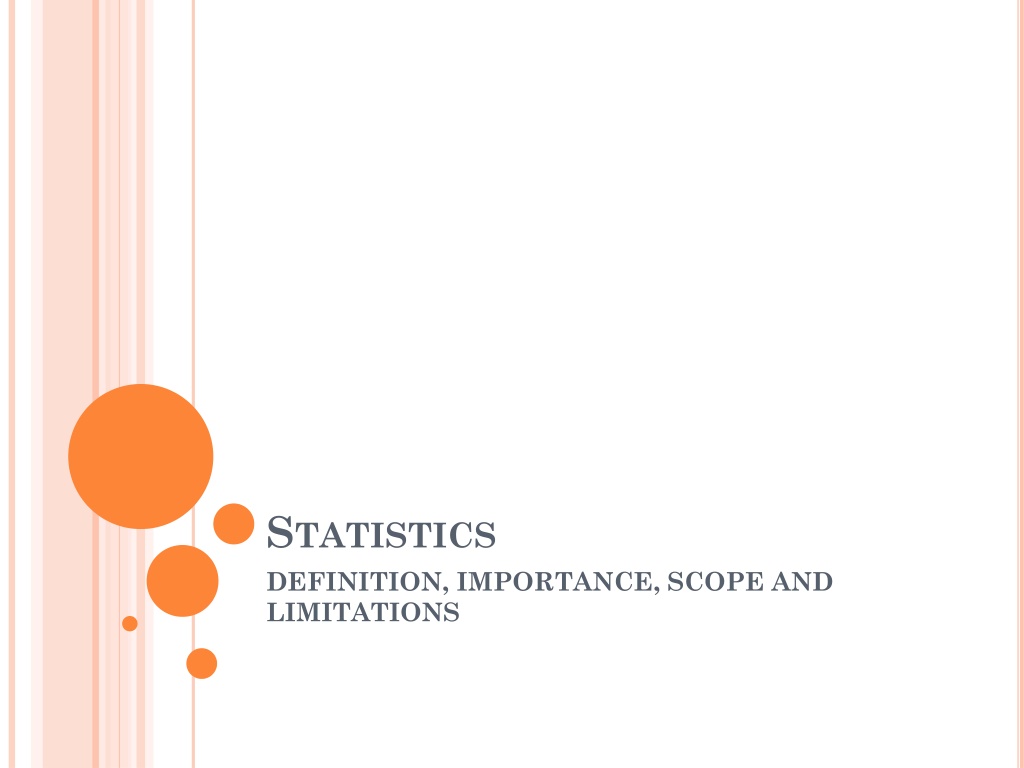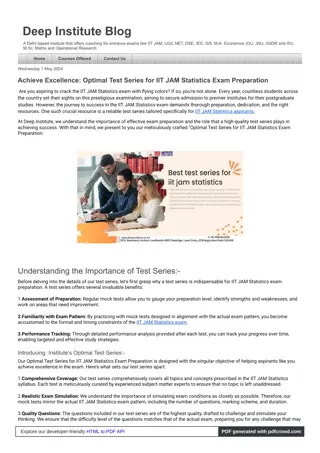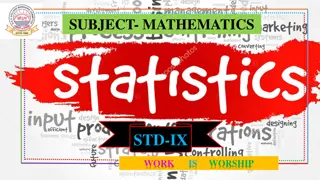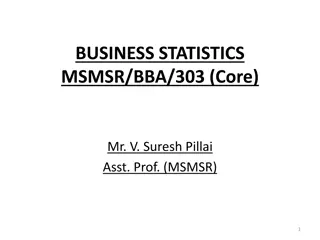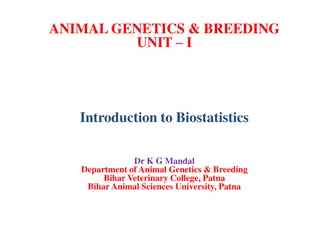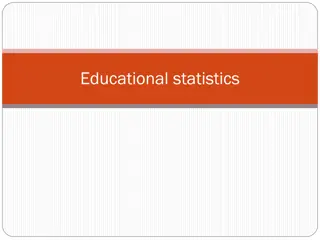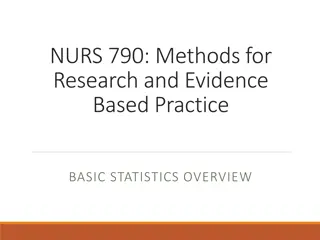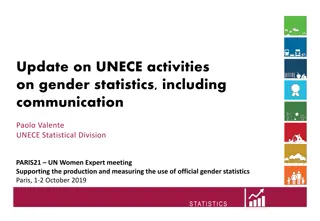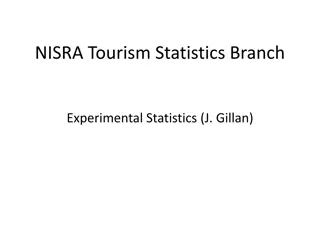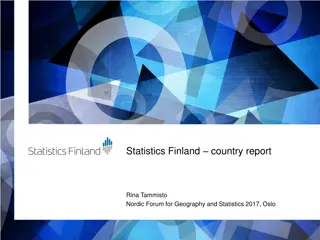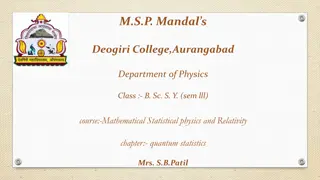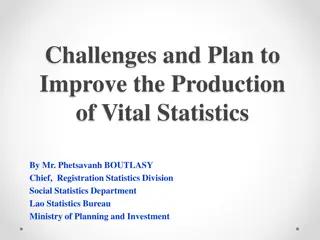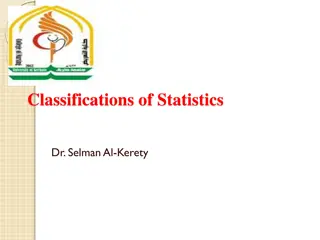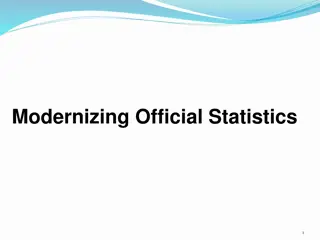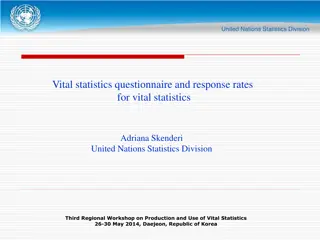Understanding the Definition, Importance, Scope, and Limitations of Statistics
Statistics is a branch of mathematics that involves the collection, analysis, interpretation, and presentation of numerical data. Its importance spans various disciplines like agriculture, economics, medicine, and more. The field has evolved over centuries with different definitions emphasizing aspects like counting, averages, estimates, and probabilities. Despite its limitations, statistics plays a crucial role in modern decision-making processes across different sectors.
Uploaded on Dec 05, 2024 | 0 Views
Download Presentation

Please find below an Image/Link to download the presentation.
The content on the website is provided AS IS for your information and personal use only. It may not be sold, licensed, or shared on other websites without obtaining consent from the author. Download presentation by click this link. If you encounter any issues during the download, it is possible that the publisher has removed the file from their server.
E N D
Presentation Transcript
STATISTICS DEFINITION, IMPORTANCE, SCOPE AND LIMITATIONS
INTRODUCTION TO STATISTICS In the modern world of computers and information technology, the importance of statistics is very well recognized by all the disciplines. Statistics has originated as a science of statehood and found applications slowly and steadily in Agriculture Economics Commerce Biology Medicine Industry VII. Planning, Education and so on. I. II. III. IV. V. VI. As on date there is no other human walk of life, where statistics cannot be applied.
MEANING AND DEFINITIONS : Meaning: A BRANCH OF MATHEMATICS DEALING WITH THE COLLECTION, ANALYSIS, INTERPRETATION AND PRESENTATION OF MASSES OF NUMERICAL DATA. A COLLECTION OF QUANTITATIVE DATA. Definitions: Statistics like many other sciences is a developing discipline. It is not nothing static. It has gradually developed during last few centuries. In different times, it has been defined in different manners. Some definitions of the past look very strange today but those definitions had their place in their own time. Defining a subject has always been difficult task. A good definition of today may be discarded in future. It is difficult to define statistics. Some of the definitions are reproduced here: (1) The kings and rulers in the ancient times were interested in their manpower. They conducted census of population to get information about their population. They used information to calculate their strength and ability for wars. In those days statistics was defined as the science of kings, political and science of statecraft (2) A.L. Bowley defined statistics as statistics is the science of counting This definition places the entries stress on counting only. A common man also thinks as if statistics is nothing but counting. This used to be the situation but very long time ago. Statistics today is not mere counting of people, counting of animals, counting of trees and counting of fighting force. It has now grown to a rich methods of data analysis and interpretation.
(3) A.L. Bowley has also defined as science of averages This definition is very simple but it covers only some area of statistics. Average is very simple important in statistics. Experts are interested in average deaths rates, average birth rates, average increase in population, and average increase in per capita income, average increase in standard of living and cost of living, average development rate, average inflation rate, average production of rice per acre, average literacy rate and many other averages of different fields of practical life. But statistics is not limited to average only. There are many other statistical tools like measure of variation, measure of correlation, measures of independence etc Thus this definition is weak and incomplete and has been buried in the past. (4) Prof: Boddington has defined statistics as science of estimate and probabilities This definition covers a major part of statistics. It is close to the modern statistics. But it is not complete because it stress only on probability. There are some areas of statistics in which probability is not used. (5) A definition due to W.I. King is the science of statistics is the method of judging collection, natural or social phenomena from the results obtained from the analysis or enumeration or collection of estimates . This definition is close to the modern statistics. But it does not cover the entire scope of modern statistics. Secrist has given a detailed definition of statistics in plural sense. His definition is given on the previous. He has not given any importance to statistics in singular sense. Statistics both in the singular and the plural sense has been combined in the following definition which is accepted as the modern definition of statistics. statistics are the numerical statement of facts capable of analysis and interpretation and the science of statistics is the study of the principles and the methods applied in collecting, presenting, analysis and interpreting the numerical data in any field of inquiry. According to, Croxton & Cowden, "Statistics may be defined as the science of collection, presentation, analysis and interpretation of numerical data."
ORIGIN AND GROWTH OF STATISTICS
SIR RONALD FISHER (1890-1962) IS THE FATHER OF STATISTICS. THE WORD STATISTICS SEEMS TO HAVE BEEN DERIVED FROM THE LATIN WORD STATUS OR THE ITALIAN WORD STATISTA OR THE GERMAN WORD STATISTIK EACH OF WHICH MEANS A POLITICAL STATE .
STATISTICS IS CONCERNED WITH THE SCIENTIFIC METHODS FOR COLLECTING ORGANIZING iii. SUMMARISING PRESENTING AND ANALYZING DATA. AS WELL AS DERIVING VALID CONCLUSIONS AND MAKING REASONABLE DECISIONS ON THE BASIS OF THIS ANALYSIS. i. ii. iv. v.
SCOPE AND IMPORTANCE OF STATISTICS STATISTICS AND INDUSTRY STATISTICS AND COMMERCE STATISTICS AND AGRICULTURE STATISTICS AND ECONOMICS STATISTICS AND EDUCATION STATISTICS AND PLANNING STATISTICS AND MEDICAL STATISTICS AND MODERN APPLICATIONS STATISTICS AND BUSINESS STATISTICS AND MATHEMATICS STATISTICS AND BANKING
LIMITATIONS OF STATISTICS STATISTICS IS NOT SUITABLE TO THE STUDY OF QUANTITATIVE PHENOMENON. STATISTICS DOES NOT STUDY INDIVIDUALS. STATISTICS LAWS ARE NOT EXACT. STATISTICS TABLE MAY BE MISUSED. STATISTICS IS ONLY ONE OF THE METHODS OF STUDYING A PROBLEM.
